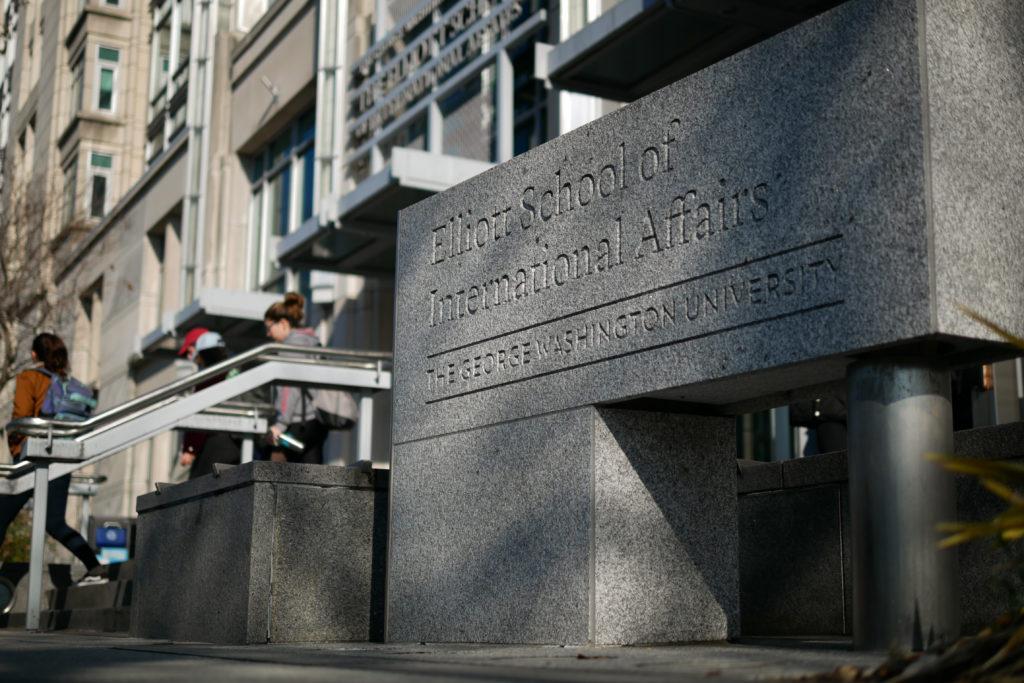The Elliott School of International Affairs is revamping its annual retreat for incoming freshmen.
Officials said they will increase opportunities for Elliott School students to connect with professors during the second iteration of the retreat and reduce its length. Higher education experts said the changes could better prepare incoming Elliott School students to establish strong relationships with professors early in their college experience that they can develop throughout their time at GW.
At last year’s retreat, which was held in late August, students participated in a scavenger hunt around campus and discussed an autobiography about a member of the Peace Corps who traveled to a village in Africa to teach English.
Jonathan Walker, the Elliott School’s assistant dean of student services, said the redesigned retreat will allow for more faculty interaction and will be shorter than last summer’s retreat. He did not specify how officials will increase interactions with faculty or the new length of the retreat.
“The changes emphasize the importance of relationship-building with faculty and staff early in students’ tenure, allow the Elliott School to begin building connections with members of the community and ensure students are informed,” Walker said in an email.
Officials launched the retreat last year as part of the Elliott School’s Leadership, Ethics and Practice Initiative, a project spearheaded by Elliott School Dean Reuben Brigety to teach students professional skills to become an “effective international affairs practitioner.”
Walker said Elliott School officials decided to make changes to the retreat based on student feedback they obtained through a survey for first-year Elliott School students released at the beginning of the fall semester.
He said the changes will better align the program with the LEAP Initiative and the University’s new freshman orientation program, which will occur around the same time as the retreat.
“The changes being made are intended to better reflect a commitment to leadership, ethics and practice, as well as to deliver the content in a way that students will best receive it,” Walker said.
Experts said the changes to the retreat will better prepare students for their freshman year by connecting them with faculty before classes begin.
Joyce Holl, the executive director of the Association for Orientation, Transition and Retention in Higher Education, said increased student engagement with faculty and advisers at orientations and first-week events helps acclimate students to school.
“Getting to know your faculty and getting to develop those relationships with the faculty helps retain students on campus, whether it’s a faculty member or staff member or other students,” she said.
Holl said shortening the first-year retreat, which is currently one day long, will not necessarily impact what students learn from the retreat as long as content is not cut from the orientation. She added that first-year orientations typically vary in length from one to two days.
“Equally as important when the students are coming back and they’re moving on to campus is activities that are happening,” she said.
LeAnn Jones Wiles, the director of first-year programs at the University of Washington, said if students have the chance to meet with faculty and advisers during an orientation program like the Elliott School’s retreat, they can begin to discuss their academic careers, explore potential majors and minors and consider which extracurricular activities to join.
“They can start early on thinking about what steps do they need to take so they can be successful and graduate and persist,” she said.
Wiles said the reduced duration of the Elliott School’s orientation will not significantly affect freshmen if advisers continue to teach students how to adjust to college throughout freshman year.
“It’s hard when you have everything packed into orientation, so information does need to be scaffolded throughout the time of a student’s first year,” she said.
Lisa Gruszka, the director of orientation programs at the University of Minnesota, said students should view the Elliott School’s changes to the retreat based on student feedback as a positive because it means officials are listening to students’ thoughts.
“It is important to consider the learning outcomes of the orientation program and plan the content and length to best meet these outcomes,” Grusza said in an email. “I would be remiss if I didn’t mention quality assessment of the program is a must to ensure you are meeting those learning outcomes.”







